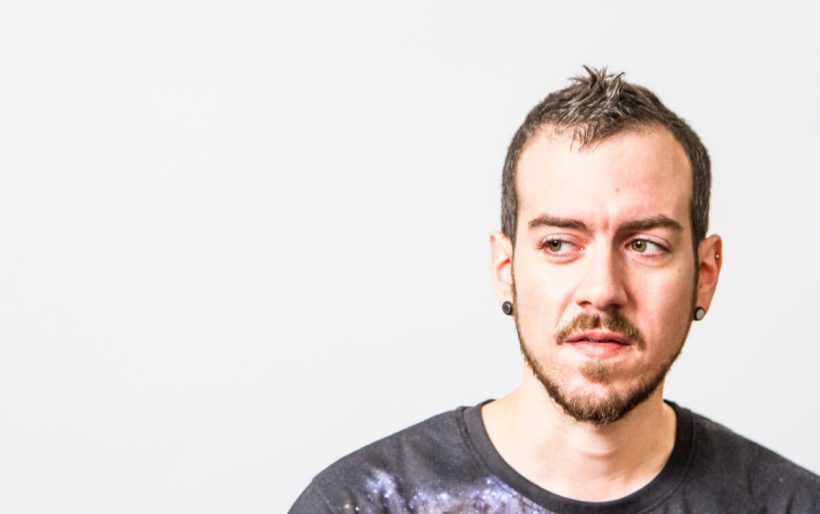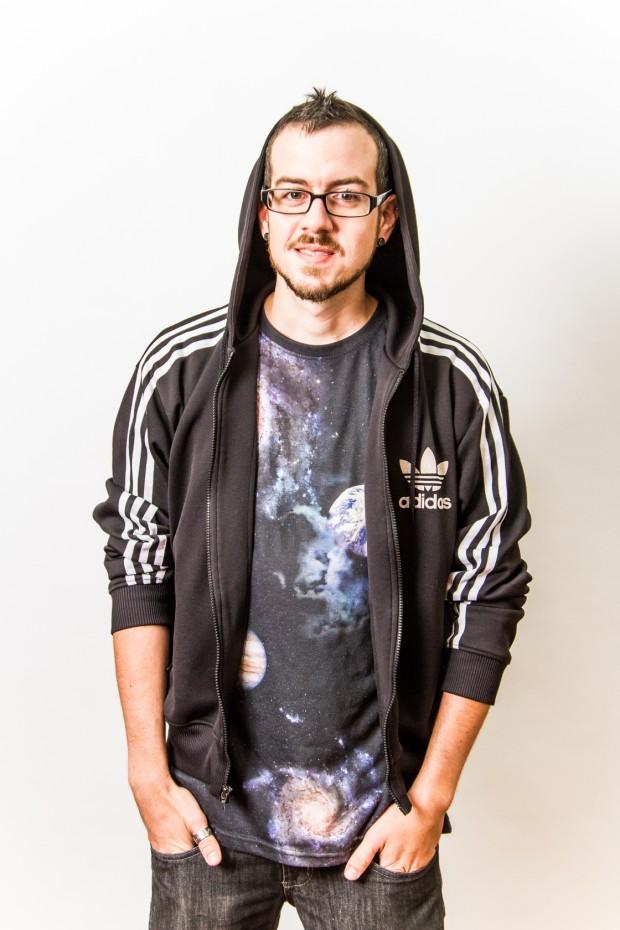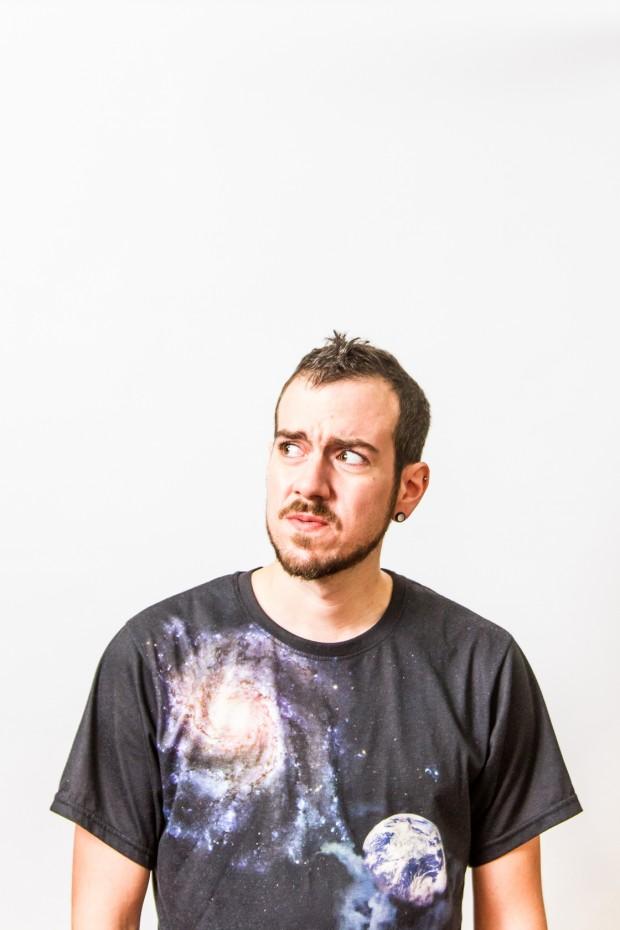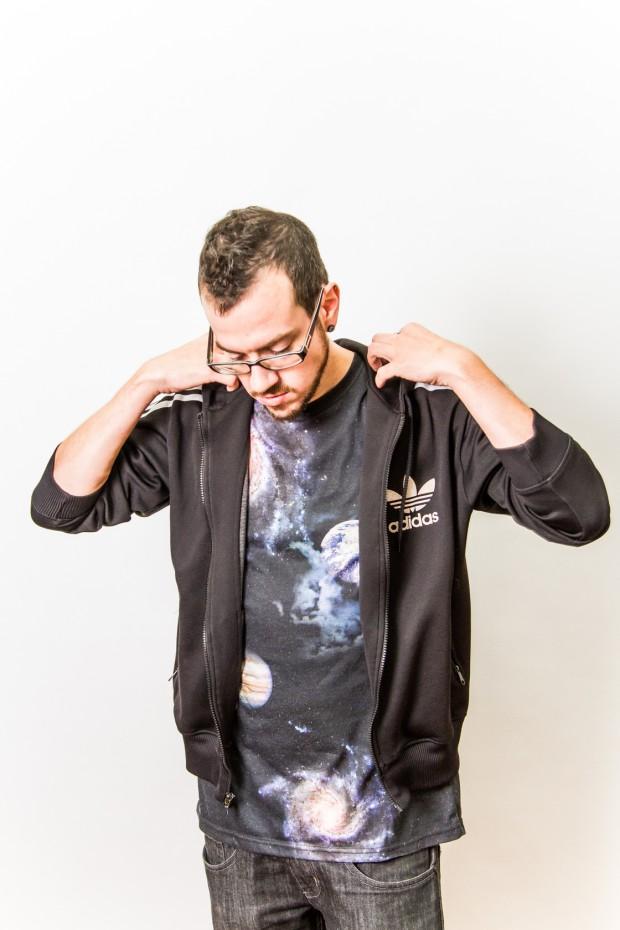The High Key Portrait Series: goldenSpiral

goldenSpiral | photo by Josh Pelta-Heller for WXPN
“High Key” is a series of profiles conceived with the intent to tell the story of Philly’s diverse musical legacy by spotlighting individual artists in portrait photography, as well as with an interview focusing on the artist’s experience living, creating, and performing in this city. “High Key” will be featured in biweekly installments, as the series seeks to spotlight artists both individually and within the context of his or her respective group or artistic collective.
Adrian Palashevsky’s been hard at work. Over the past few years, the hip hop producer, multimedia artist and DJ — better known as goldenSpiral — has been fashioning beats, collaborating with his Philly music compatriots, and staying up late.
A taste of the results of all that sweat equity is available this week, with the release of the Dark Matter EP at goldenSpiral’s Bandcamp site, where it will be featured exclusively for two weeks prior to international distribution via Empire and Redeye. Published by Kyle Taylor’s Philly-based blog-turned-label Funkadelphia, the EP is a diverse sampling of the producer’s talents and influences, and features vocals from the ethereal Alicia Talia, and rappers Calvin MC, and Voss, whose standout single “NightVision” will have a music video directed by Pipus The Wise out later this Summer.
In the Fall, goldenSpiral will drop a full-length LP that he considers to be definitive work that he’s excited to share, a magnum opus called Waveformation which will also be published on the Funkadelphia label. The album will boast two music videos including single “Eternal Life (dub),” spotlighting vocals from Philly reggae darling Sonni Shine, in case you’ve missed her (and you should have) since The Underwater Sounds called it quits earlier this year.
In the meantime, Dark Matter is live as of noon on Tuesday, July 12th, and Palashevsky is offering the EP on a name-your-price basis, or for fair trade for just an email address. So all you hip hop/glitch/dub-heads, just click on that link and hit refresh, refresh…
The Key: Are you a Philly transplant, or Philly born and raised?
goldenSpiral: Well, I consider myself born and raised, but, I was actually born and raised in South Jersey, right over the bridge, in Cherry Hill.
TK: I think that counts.
gS: My parents are from Philly. I was born at the old CHOP, and I went to Temple University, and I’ve been living in the city since 2002.
TK: How’d you first get connected to the Philly music scene?
gS: I first got involved with Philly’s live music scene with the premiere of my collaborative project, called The City Music Project. Before then I was just workin’ in studios and kind of perfecting my craft, and workin’ as an engineer. And I got involved with a friend of mine named Frank Cervantes, who was a singer and songwriter, and guitar player, and we formed this group based on a vision I had that came to life pretty quickly. Basically, our first EP, the first track, I stayed up all night mixing, sent it to Frank, and he woke me up the next morning at noon, he said, “yo turn on the radio, turn on XPN!” And the song that I’d stayed up all night mixing was on the radio, and Helen Leicht was like, talkin’ about us, and talkin’ about The City Music Project, and myself…
TK: …that was quick…
gS: …dude it popped off, right away! And the first show we did, which was our EP release party, was at Silk City, and it was packed. And then the second show we did was downstairs at World Cafe Live, on a Saturday night. We headlined and pulled like 200 people. So you know that’s how it started. The City Music Project, that went on for like three years, from 2009-2012, give or take. We released a full-length album, worked at Studio 4 with Will Yip and Phil Nicolo, and just got tremendous feedback from it. It was a really well-received project. And then, from there, we parted ways, and went to do our own thing. Frank had kids and had a family, and I wanted to kind of pursue my ambitions as a solo artist, a DJ and producer. Then I started working with Kuf Knotz, I was working with Kuf for awhile, we were doin’ our live thing — ‘cause I do live production and stuff, where I’m like triggering the arrangements live, a real-time experience as opposed to just a DJ who’s like spinnin’ vinyl or whatever. It’s been something where I’ve been able to break into a number of different scene, and bridge gaps and stuff. It’s been good, I’ve been able to meet a lotta people and make some great things happen.

goldenSpiral | photo by Josh Pelta-Heller for WXPN
TK: Who’s your favorite Philly artist, or which Philly artists has influenced you most?
gS: I’m a big fan of the Underwater Sounds, I think they do great stuff. It’s hard to say who’s my favorite, ‘cause there’s so many great artists in Philly. And I’m sure that’s probably the answer you’ve gotten. I really like Agent Zero — him and I were in a group called Psy.Fi, which is an artist collective. We had a monthly at The Blockley and we were able to really showcase a lot of great Philly artists and electronic musicians and visual artists as well. I think what’s great about Philly is that the art and the music scene kind of like, tie into one another, and they’re becoming almost one in the same. WorldTown, they’re just killin’ it, they’re awesome. Also Wax Future is dope.
TK: I think you touched on this briefly, but where did you play your first Philly show, and how do you remember it feeling to perform?
gS: My first show was at Silk City. And I loved it. The sound system alone just like blew me away. Hearing my stuff coming from these deep sub-woofers, and the energy that we were able to raise in that room was something special, and I’ll never forget it.
TK: What’s your favorite venue to play in Philly?
gS: I like Kung Fu Necktie, they’re really cool for intimate shows, you know what I mean? They’ve got a really great layout too, I think the layout is so important in venues, you know, like to have the right flow in the room, where people know where to stand and know where to hang out if they’re not listening to music, and it doesn’t segregate people too much between those who wanna drink and those who wanna watch music, they can do both. But sometimes with Kung Fu Necktie, it’s like it’s not big enough, so my next choice is Underground Arts. I think Underground Arts is one of the last venues like that, owned by one of us. They’re working with Bonfire a lot more, and LiveNation, and you I think that’s great, they need to make their money and pack the shows out as much as possible. But they do still connect to the Philly music scene and allow crews and promoters and artists to come in and throw events there and utilize the space, and I think it’s a really valuable place in that respect. They’re really cool guys, it’s owned by music fans, they have a recording studio in there, you know what I mean? I think that tells you a lot about their philosophy.

goldenSpiral | photo by Josh Pelta-Heller for WXPN
TK: What do you love most about the music scene in Philadelphia?
gS: I love being around so many other incredibly talented artists. Being among peers who are pushing the envelope and whose music excites me and provides a lot of inspiration. It makes you feel like you’re a part of something special. I also really like Philly’s taste for art. I think that the Mural [Arts] Program, and how many art pieces you see around the city is a testament to that. It’s like a real kind of visual aesthetic that Philly has to it, and it’s most exciting to see musicians sorta tapping into that. My friend Getup does a great job with that. And I think that’s almost like the future. It’s like, when you’re creating a full-on brand, and you’ve got spraypaint pieces that are valued as art, and you’re doing visual art, and you’re doing music, and you’re doing three or four different things that are part of one complete package, I think that’s really the future of Philly.
TK: What if anything to you find frustrating about it?
gS: I think every artist has struggled with building their fanbase and breakin’ out to new audiences. I don’t wanna come off that I’m complaining about it, or anything, but I think the music-goer, the non-artist aspect of the music scene can at times being closed-minded about new things, or artists that don’t fit into one kind of mold, or one kind of style. If you don’t call yourself one thing, or if you don’t associate with one kind of scene that’s poppin’, it can be hard to break out, you know what I mean? But I think that’s coming along, and people are kind of developing a hunger for something new, and kind of seeking that out. I’m optimistic about it. The other thing I think that’s frustrating is dealing with venues, sometimes, that make it very difficult to make a living as a musician. So many of these venues just wanna do everything in their power to just not pay artists, at times, or pay as little as possible. Unless you’re like selling out the TLA, it’s impossible to get like a really good guarantee that you can pay your bills or anything, so it puts you in a position where you gotta find other lines of work and stuff, and that can detract attention from your art. I’ve seen artists who I know are incredibly talented who are just like not fully realized because they’re not able to just focus on their art, and living. Either they find other ways to get art out there that’s makes them money, which is great, and it’s what you need to do, but it’s not always that simple. I think that if we could find a better way to work with venues to find an arrangement that works for both parties in certain respects, I think that would go a long way.
TK: Which Philly neighborhoods have you lived in? Which made you want to stay, and which made you wanna bail?
gS: I’ve lived in North Philly, like in Temple campus area, when I was goin’ there. I wouldn’t live there by choice. I lived in Old City, for two years — I lived at 3rd and Arch, which is like the heart of Old City — and I loved it. I had an amazing place there that I got a really great deal on, because the finished basement wasn’t considered a room, but it actually was. That made me wanna stay. Unfortunately I couldn’t, because my roommate left, and I couldn’t find another roommate to replace him. That was at the time when Luke O’Reilly and his whole crew was just doin’ this jam sessions at the Marmont, 222 — I don’t know if it’s still called that or not, but it’s on 2nd and Market — and I was just goin’ there whatever the night of the week it was, and there was just really great live jazz comin’ outta there. I would run into guys from the Roots that lived in the neighborhood and stuff. I’ve also lived in Fairmount, which was great, 19th and Poplar. I’m in West Philly right now, kind of off of University City, off of Drexel’s campus. And it’s great. I really like West Philly, I think there’s a great vibe in that area. There’s a lotta great homes that are really unique, and I think it attracts a certain kinda person that tends to be really cool.

goldenSpiral | photo by Josh Pelta-Heller for WXPN
TK: What’s your preferred means for getting around town?
gS: Well, as far as seeing the city goes, I like to walk. When I was living in Old City I would walk everywhere and ride my bike, just do laps around the neighborhood just to get fresh air and see all the craziness goin’ on in Old City. I also drive now, that’s my main form of transportation, but that has a lot to do with my work, I need transportation to get around.
TK: PBC or Yards?
gS: PBC.
TK: How have you seen the city change overall, in your time here, and has it been for the better or worse?
gS: I think one of the most important things that has changed for artists here in Philadelphia is the understanding that we need to work together to build a scene that’s worth sticking around for. For so long, it was every man for himself in this town. Bands, musicians, singers, MCs all trying to achieve success would grab it and run the first chance they had. This was mainly the result of a lack of opportunity here at home, a self-perpetuating cycle. Almost all opportunity to build came from out of town, so people would climb over one another to get it, and leave each other behind once they had it. But after so long, I think everyone started to realize how little this was working. We finally learned that cooperative organized efforts were the way to go, and things have been much better since. Now we have the chance to develop as artists within the community. We have locally owned labels, production companies, radio stations, venues, and scenes that are poppin’, it’s awesome to see. Granted, there’s still a lot of room for growth before we’re on the level of Brooklyn, Austin, Denver, etc. But it starts with the realization that the only way to have real opportunity to thrive culturally, in a way that can be shared by the community, is to build it ourselves. At the very least this gives us a place to establish ourselves, from which upward mobility becomes much more possible.
- goldenSpiral | photo by Josh Pelta-Heller for WXPN
- goldenSpiral | photo by Josh Pelta-Heller for WXPNgoldenSpiral | photo by Josh Pelta-Heller for WXPN
- goldenSpiral | photo by Josh Pelta-Heller for WXPN
- goldenSpiral | photo by Josh Pelta-Heller for WXPN
- goldenSpiral | photo by Josh Pelta-Heller for WXPN
- goldenSpiral | photo by Josh Pelta-Heller for WXPN
- goldenSpiral | photo by Josh Pelta-Heller for WXPN
- goldenSpiral | photo by Josh Pelta-Heller for WXPN
- goldenSpiral | photo by Josh Pelta-Heller for WXPN
- goldenSpiral | photo by Josh Pelta-Heller for WXPN
- goldenSpiral | photo by Josh Pelta-Heller for WXPN
- goldenSpiral | photo by Josh Pelta-Heller for WXPN
- goldenSpiral | photo by Josh Pelta-Heller for WXPN
- goldenSpiral | photo by Josh Pelta-Heller for WXPN
- goldenSpiral | photo by Josh Pelta-Heller for WXPN
- goldenSpiral | photo by Josh Pelta-Heller for WXPN















